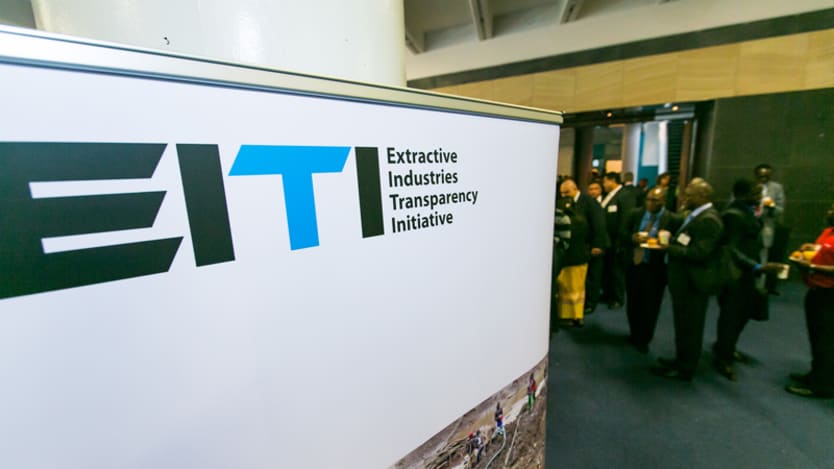
LONDON — The United States’ decision to pull out of an international program to prevent corruption in the oil, gas, and mining sectors “sends the wrong signal” to countries that are already signed up, and to those that might be considering joining, experts have warned — pointing especially to the impact on resource-rich developing countries.
However, others said the move could promote greater ownership and commitments from some developing countries.
The Office of Natural Resources Revenue within the U.S. government officially signalled it was leaving the Extractive Industries Transparency Initiative, or EITI, “effective immediately” last week.
The move comes just as revelations about loans made by Swiss mining giant Glencore in the “Paradise Papers” leak appear to highlight the importance of transparency initiatives.
Founded in 2003, the EITI is a multi-stakeholder program that sets reporting standards for governments and companies to crack down on corruption linked to state-owned oil, gas, and mining assets. It currently has 52 implementing countries, including resource-rich nations in sub-Saharan Africa, Latin America, and Asia. The initiative also has 16 supporting countries, mainly from the global north. The U.S. had been working toward becoming a fully compliant implementing country since 2012, and is also a supporting country.
The United States’ decision to withdraw, which EITI expected, means that American oil, gas, and mining companies will not have to disclose what they pay to the U.S. government, including tax, to gain access to domestic natural resources. However, U.S. companies will still have to report payments they make in countries that remain signed up to the EITI. The U.S. has also said it will still support the EITI internationally through financial and political assistance, and will retain its position as a supporting country.
“While the U.S. government remains committed to fighting corruption in the extractive industries sector, and the ideals of transparency enshrined in the EITI Principles … effective immediately ... the United States must withdraw as an EITI implementing country,” the letter to the EITI board chair states.
EITI staff, board members, and civil society groups have greeted the move with dismay and described it as a “backwards step” for transparency — one that could discourage other resource-rich countries from joining the initiative. However, some experts argued the U.S. exit could promote greater developing country ownership over the initiative, and pointed to the fact that Mexico and Guyana recently joined, despite growing uncertainty around U.S. membership.
“While this decision doesn’t have a direct impact on developing countries — many of which are doing a good job implementing the EITI principles — it is a step backwards and it obviously sends the wrong signal about the importance of this work,” EITI Technical Director Sam Bartlett told Devex.
Bartlett also said the move could make it harder for the EITI to make the case for other countries, such as South Africa, Brazil, and Russia, to join. “It’s more symbolic … as we’re trying to convince other countries [to join] … they may well say ‘why should we if the U.S. is not doing it,’” he said.
A ‘real opportunity?’
Plans to legislate transparency of Australia's international mining operations
Australia's Labor party is pushing for a comprehensive legislation requiring internationally operating mining giants to be transparent in their financial dealings with governments and communities. At the Australian Council for International Development 2017 National Conference, Shadow Assistant Minister for Treasury Matt Thistlethwaite made his pitch to the development sector, which has long criticized the secrecy surrounding how Australian mining companies operate abroad.
Moses Kulaba, who chairs the EITI finance committee and is also executive director of the Governance and Economic Policy Centre in Tanzania, described the U.S. decision as “regrettable and a dirty decision,” but also said the EITI board “saw it coming.” He agreed that the move could make other resource-rich countries that may be willing to join EITI “think twice.”
“It is … likely that the U.S. decision [is] lifting the lid off the can for potential candidate countries and current implementing countries [to] follow suit,” he said.
However, others were more optimistic about the potential impact. Faith Nwadishi, who represents anglophone African civil society on the board of EITI, said: “Globally people will want to see this as weakening the initiative, but I see it as making the initiative strong and achieving its objective. As the initiative gets stronger, failing countries are finding the easy way out.”
Similarly, Erica Westenberg, director of governance programs at the Natural Resource Governance Institute (NRGI), said while the loss of U.S. leadership showed “an unfortunate backsliding,” many EITI member countries appeared to be “rejecting this” decision. The move could turn into a “real opportunity” for resource-rich countries in the global south “to take on even more of a leadership role on this,” she added.
The U.S. decision has also called into question whether it is appropriate for the U.S. government, and U.S. oil companies Chevron and ExxonMobil, to retain their seats on the EITI international board. Bartlett said “this situation will probably lead to calls for the EITI board to examine the matter further.”
U.S. position in question
The U.S. decision to leave has raised questions about the country’s role in EITI going forward. To date, just one other country — Azerbaijan — has withdrawn from EITI. A few countries, including Equatorial Guinea, São Tomé, and Yemen, have been “delisted,” but São Tomé subsequently rejoined, Bartlett said.
The American Petroleum Institute has long made its opposition to some kinds of payment disclosure known. Its lobbying efforts proved successful in February with the overturning of a piece of legislation known as the Dodd-Frank Section 1504. The legislation would have required extractive companies listed on U.S. stock exchanges to disclose payments made to governments around the world, rather than just the U.S. government — conditions API says would make U.S. companies less competitive.
However, the U.S. has historically been a strong supporter of EITI. Its letter to the board suggests this will continue, stating that the U.S. plans to keep offering the “political and financial support” it has offered “over many years” — including by helping individual countries such as Guyana complete the long process of joining EITI.
While the U.S. had intended to become an implementing country and has been working toward becoming compliant since 2012, it says it was unable to do so due to legal obstacles — something that civil society groups and the EITI itself dispute.
“In fact, no legal obstacle exists. Companies’ unwillingness to disclose taxes paid to the U.S. government (a cornerstone of EITI implementation) has been a major challenge in the U.S. since it became an EITI candidate country in 2014,” according to a statement from the NRGI.
Corinna Gilfillan, head the U.S. Global Witness office, told Devex that some major companies had been “very obstructive” from the time the U.S. started the validation process of becoming an EITI implementing country.
However, Gilfillan also said there have been some positive examples: Texas-based oil company Kosmos Energy, for example, has been voluntarily disclosing its tax payments for years, she said.
Westenberg said some suspect U.S. oil companies are hoping to hide “how little tax is being paid” and that this is part of a “much larger narrative around taxation, not just in the extractive sector, where corporate interests have benefited greatly from being able to avoid the full range of tax payments owed to citizens,” she said.
However, Bartlett pointed out that the majority of companies in question are publicly listed, so they already disclose much of the information EITI requires. In his view, it’s more a point of principle.
“I don’t think there’s necessarily anything to hide. These companies are already disclosing a lot of this information, he explained. “It’s more about … a culture of not disclosing this kind of commercially sensitive information.”
Read more Devex coverage on the extractives industry.








